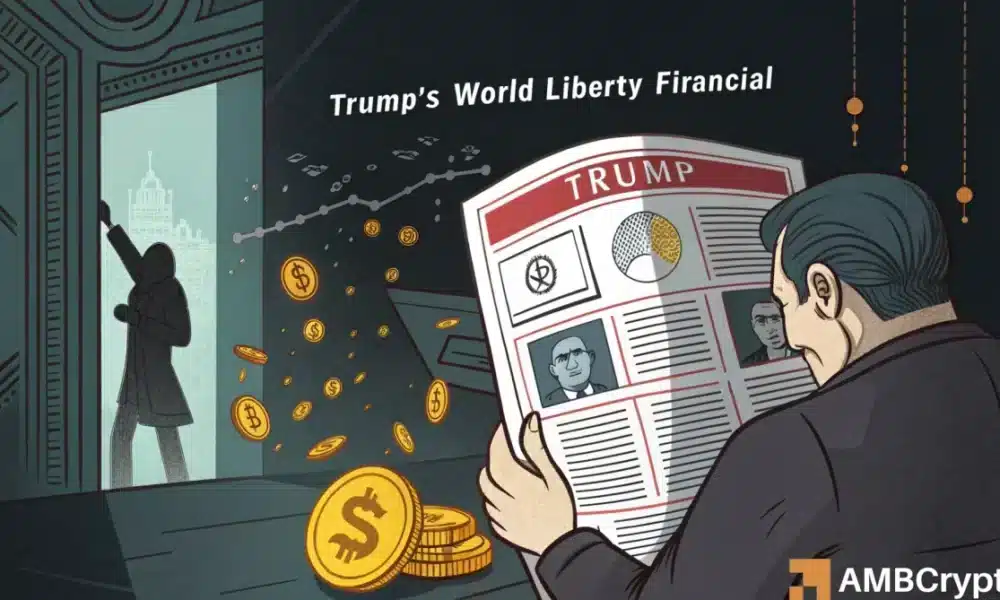Trump’s Cryptocurrency Ventures: A Dual-Edged Sword of Wealth and Scrutiny
Donald Trump’s foray into cryptocurrency through his venture, World Liberty Financial, has recently come under fire, raising significant national security and regulatory concerns. According to a report from the watchdog group Accountable.US, Trump’s company has allegedly sold crypto tokens to entities with connections to North Korea, Iran, and sanctioned money-laundering operations. Given the geopolitical implications and the vast sums involved—over $1 billion in personal wealth for Trump through this initiative—it’s essential to dissect these revelations and understand both their impact and the broader regulatory landscape.
The Scale of Trump’s Crypto Wealth
Trump’s involvement in cryptocurrency isn’t merely a sideline hobby; he has reportedly amassed substantial wealth from World Liberty Financial, earning over $57 million as crypto assets now constitute 73% of his net worth. This substantial investment illustrates a key point: Trump’s commitment to cryptocurrency extends beyond his public endorsements, making him a significant player in the digital asset space. However, this rise in wealth comes with precarious elements that invite scrutiny, particularly as the family appears to aggressively expand their digital holdings.
Red Flags: Transactions with High-Risk Entities
The allegations raised by Accountable.US spotlight troubling transactions associated with World Liberty Financial. For instance, a trader known as Shryder.eth purchased $10,000 worth of WLFI tokens on Inauguration Day and has since been linked to dealings with a Treasury-sanctioned North Korean entity, the Lazarus Group. Further complicating the situation, other transactions have involved parties connected to Iran’s largest crypto exchange, NoBitex.ir, known for sanction violations. Such patterns create a clear red flag, raising questions about the due diligence undertaken by Trump’s company.
Regulatory Oversight and Delayed Responses
Despite these alarming connections, World Liberty Financial took what appears to be minimal action to mitigate the risk posed by high-risk users until well after the fact. The firm reportedly blacklisted only five accounts flagged for high-risk exposure in September 2023, months following the highlighted transactions. The delayed response, particularly concerning Shryder.eth’s wallet, suggests a troubling lack of proactive regulatory compliance. This has prompted additional scrutiny from Democratic lawmakers who are increasingly focused on potential misuse of financial ventures for illegal activities.
Broader Implications for Crypto Regulation
The unfolding situation has placed a spotlight on broader regulatory issues surrounding cryptocurrency, especially concerning the U.S. Securities and Exchange Commission (SEC) and its oversight of digital assets. With Trump’s ventures coming under close examination, some observers, including Senator Elizabeth Warren, have voiced concerns over the cleansing of potentially culpable entities. As more investments flow into risky ventures, the need for robust oversight becomes even more salient, with implications not just for Trump, but for the cryptocurrency sector as a whole.
The Future of the Trump Family’s Digital Empire
The recent developments concerning World Liberty Financial and Trump’s growing crypto empire add a new, volatile chapter to his financial narrative. With his family’s ventures reportedly adding nearly $1.3 billion to their fortune, this could signal both opportunity and risk. As cryptocurrency continues to evolve, the future of Trump’s digital assets hinges on regulatory frameworks that will surely adapt in response to the complexities unveiled by these allegations. As communities, investors, and regulators navigate this unpredictable landscape, the question remains: can Trump’s ventures exist within a compliant framework, or will they fall victim to the very scrutiny they so heavily invite?
In conclusion, Trump’s rise in the crypto world not only reflects personal ambition and a calculated financial strategy but also unveils underlying national security risks and the pressing need for regulatory reform. The cryptocurrency domain is rife with opportunity, but without proper oversight, it also possesses the potential for exploitation that can reverberate across geopolitical landscapes. As this story unfolds, the implications for Trump, his family, and the cryptocurrency landscape will certainly continue to shape discussions well into the future.


